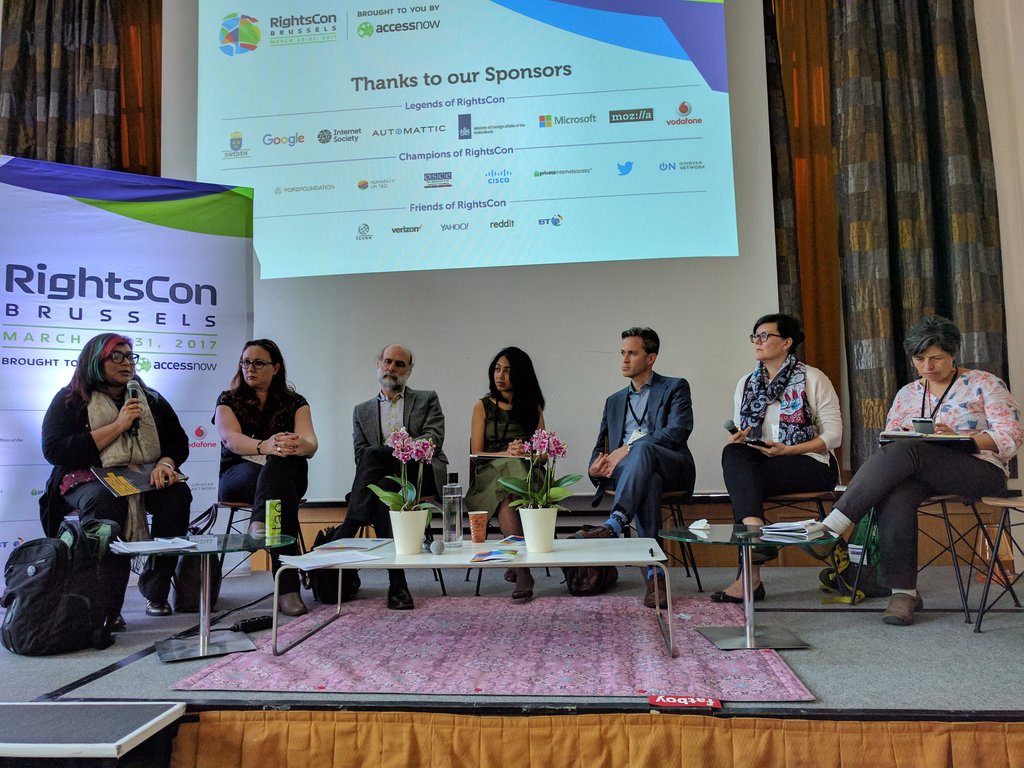This is a guest post by Nighat Dad with Hija Kamran of the Digital Rights Foundation in Pakistan, a regional partner of Access Now.
In a world where people struggle for basic human rights and are put behind bars when they fight for those rights, they confront countless challenges every day. And if they happen to be from an oppressed or minority group, those struggles grow exponentially. Individuals and organizations are working beyond borders, day in and out, to make this fight easier for those who don’t have the information or capacity to fight for themselves. I head one such organization: the Digital Rights Foundation (DRF).
DRF is a research-driven non-profit advocacy organization based in Pakistan. We use Information and Communications Technology (ICTs) to fight for human rights, democratic processes, and better digital governance. We have been operating since 2012, and in only five years’ time — in collaboration with organizations including Access Now — we have established ourselves as a global presence, making strides for digital rights in Pakistan and around the world.
DRF focuses on the right to data privacy, and the issues pertaining to gender in technology — particularly the internet. In a society like Pakistan, where centuries-old cultures prosper and people tend to follow the conventional lifestyle, it’s especially difficult to introduce the concept of a right to privacy in one’s life. In a country where women can’t voice their views without being harassed, DRF speaks out for women’s rights in the online world. As I have often argued, the internet needs women. Their voices are the future of Pakistan.
At DRF, we believe that inclusivity for oppressed groups on the internet will make the future world better for everyone. The work that we do includes fighting to strengthen protections for human rights defenders in Pakistan, as well as advocating for women and other minority groups to have safe access to online platforms, where they can exercise their constitutional right of free speech without facing constant threats.
Here’s a look at three of our projects to help strengthen women’s digital rights.
Rolling out Pakistan’s first Cyber Harassment Helpline
To address threats to free expression and expand our support to women — and move a step closer to a safer internet for all — DRF ran an year-long campaign in 2016 called “Hamara Internet” (Urdu for “Our Internet”) throughout Pakistan. Through this campaign, the team conducted 17 training sessions with 1,800 women studying in colleges and universities to talk about the many aspects of online violence that women face, and how they can counter those challenges without ending up in the unpleasant situations that most young women fall victim to. The lack of support makes these experiences much worse for the women.
It was realization of the fact that women need this kind of support now than ever that led DRF to establish Pakistan’s first Cyber Harassment Helpline in December of 2016. This helpline is one of a kind, providing free, safe, confidential, and non-judgmental service to the victims and survivors of online violence. Our report shows that in four months of operation, the helpline received 535 calls, of which 62% of calls were made by women and 37% by men. These stats challenge the very notion of cyber harassment is something that only women fall victim to.
Measuring Pakistani women’s experiences of online violence
However, the fact remains that women and other minority groups are those most affected by online violence. We recently released a report on the issue, “Measuring Pakistani Women’s Experiences of Online Violence.” The data collected from 1,400 women shows that 70% of women are afraid to put their photos online because they can be misused. Moreover, 50% of those surveyed believe that social media is the worst for online violence.
The report highlights the major issues that women face online, and fills the gap of existing data around online violence in Pakistan. Our hope is that this information can take the conversation about digital rights forward, bolstering advocacy for women in Pakistan and around the world.
Documenting surveillance of female journalists in Pakistan
Sometimes gendered violence against women has an even more direct relationship to free expression. DRF has published a study, “Surveillance of Female Journalists in Pakistan,”which details the experiences of seven female journalists and the surveillance that they face in the course of their work and beyond.
The female journalists interviewed for the study said they were not only surveilled by state authorities, but also subjected to abuse on social media, with attacks targeting their gender and appearance, rather than legitimate criticism of their work. In addition to mapping the forms of surveillance female journalists face, the report explores the impact that this constant monitoring has, in terms of the psychological toll, self-censorship, and retreat from digital spaces.
A global conversation: DRF at RightsCon
In the fight for human rights in our digital age, we are all connected. Our conversations can help to illuminate common problems, and together, we can form better solutions. For this reason, DRF has participated in international conventions and conferences like Internet Freedom Festival (IFF), Internet Governance Forum (IGF Afghanistan and IGF Mexico), Myanmar Digital Rights Forum, and Access Now’s RightsCon. We’re working with partners to address the many issues concerning digital freedom, and helping to amplify gendered perspectives on these rights as global citizens.
RightsCon Brussels: Panelists speak at the session organized by Digital Rights Foundation – March 2017
Of course, this is just a small sampling of the work we’re doing to help make the internet a safer place for women to enjoy their rights to data privacy and freedom of expression. If you’d like to learn more or support our work, we invite you to visit our website, and stay tuned for more updates.

